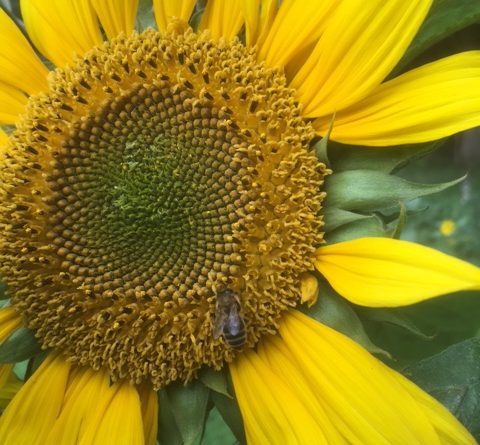The Apiary in August
As we all suspected August turned into a dry cold month preventing colonies getting out to find any nectar and pollen from the few flowers that have survived. Those of you near to water courses may find they are able to work the Balsam and other water plants but most of us don’t have that luxury at present.
I’ve left taking my honey crop off until later in the month as some hives especially my Nuc’s are really struggling for food to survive, let alone get through the winter.
But after removing my honey I always put an empty super on top of the Queen excluder and brood box ready for feeding Syrup or Fondant.
The crown board goes on top of that and then any wet supers, after extraction, above that (placed on in the evening to prevent feeding frenzies) so the bees can clean them up and take any residue down for winter food.

The supers are stored away carefully for next season with a metal Queen excluder top and bottom to keep out those pesky mice who, if you are not careful, will make them their winter homes.
Ensure robber bees and wasps don’t have access and try to keep them dry in a garage or shed, the last thing you need in April is taking them out to use and finding them destroyed or full of damp or mildew.
In August we can still feed syrup or other manufactured liquid feed as the bees have the time to cure it and remove the water content, ready for storage over the next 6 months when no more substantial food will be available as forage.
Those of you who use Fondant can put this on towards the end of the month, wet side down, on the Queen excluder but remember to leave the plastic bag it comes in on the hive as this keeps it moist for the bees to collect and remove to their brood combs.

It is also time to think about Varroa treatment, if you think you may have a problem, which can be started at the same time you are feeding the colony.
I never recommend any products but whatever you use keep, a record of medicines used, as we are required to by the law of the land. If using Apiguard be aware it only works at a temperature above 15 degrees and these August temperatures are at times well below that!


If you have any Nucs you have bred Queens in this season, that are not now covering about 5 frames with bees, they are unlikely to survive the winter as they have insufficient numbers to keep themselves and the brood warm.
You either boost numbers by removing a frame of sealed brood ( no bees) from a strong hive in your Apiary or unite with another hive.
I will normally destroy the older Queen when uniting ( Keeping the best Queen hopefully) and put newspaper between the colonies so by the time they eat through the paper they all smell the same and this prevents any aggression between them. I will also always feed a little syrup to try and help the process along.

The wasps are becoming a real nuisance in some areas and although they are nature’s undertakers and pollenate many plants, when they attack my hives it is time for them to go. I put up wasp traps away from the hives and kill any nests I find near to the Apiary.
Get your entrance block in and in doing so reduce the gap the bees have to defend against the intrusive wasps or I’m afraid to say “robber bees”

Those of you who have any DIY skills will have seen the old Varroa floors I adapted with cone escapes underneath which continue to attract/ trap dozens of wasps and not a few wax moth. Please see previous articles on their construction and use.
This dry weather will not last forever so please make sure hives are weather proof for the wet cold months ahead. The damp and wet will kill a colony a lot sooner than the cold ever will.
Those of you with new Apiaries, ensure you are not in a flood zone and tie the hives down if you live in a really windy area like up at Snitterfield Airfield.
Please always wear protection equipment when “fiddling” with colonies at this time of year, they can be very defensive as the entire world, including you, are trying to take their winter stores!
Next Month: Preparing for the Autumn flow from Ivy and further winter preparations.


